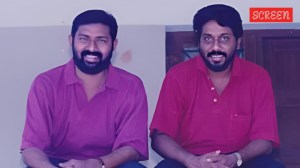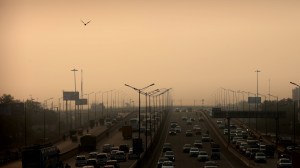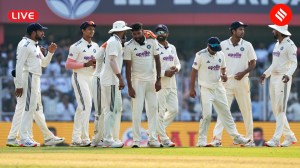High fees, less seats in India force many to study in even lesser known countries
Data sourced from Foreign Medical Graduates Examination (FMGE) shows that medical students from 54 countries appeared for the exam to acquire a license to practice in India. The list has countries, including Saint Kitts, St Lucia, Curacao, Belarus, Tanzania and Belize among others.
 Students who were evacuated from Ukraine arrive at the Hindon IAF airbase in Ghaziabad on Thursday. (Express photo by Praveen Khanna)
Students who were evacuated from Ukraine arrive at the Hindon IAF airbase in Ghaziabad on Thursday. (Express photo by Praveen Khanna)The lure of a medical degree, limited seats in government colleges and high fee in Indian private colleges are forcing students to seek admission into medical colleges in not only known destinations but even in lesser known smaller countries.
Data sourced from Foreign Medical Graduates Examination (FMGE) shows that medical students from 54 countries appeared for the exam to acquire a license to practice in India. The list has countries, including Saint Kitts, St Lucia, Curacao, Belarus, Tanzania and Belize among others.
According to the data from National Board of Education, between 2015 and 2020, 1,26,064 Indian MBBS overseas graduates from 54 countries took FMGE. Most students, upon their return, have to clear the FMGE for a licence to practise in India.
Between 2015 and 2020, among them, 422 appeared for FMGE from Saint Kitts and Nevis – a dual island nation situated between the Atlantic Ocean, 299 were from
Saint Lucia – an Eastern Caribbean island nation and 461 from Belize. From Azerbaijan, 170 students sat for FMGE. In Belarus, which is one of the poorest countries in Europe, 683 appeared for the screening test to practice in India.
Many say that the actual number of students going to these destinations is far more.
Compared to league medical colleges, most medical colleges in Caribbean countries are new and are still developing their infrastructure. Also, due to limited population, the number of patients is less, which limits the clinical experience of students.
“Many medical colleges don’t have their own hospital, which hinders clinical practice. Then if they get through the screening, they get overwhelmed during internship in short-staffed government medical hospitals in India,” said a doctor from Pune.
Talking to The Indian Express, Dr A Najeerul Ameen, president of All India Foreign Medical Graduate Association (AIFMGA), Delhi, said that actual figures of students studying in these regions are far more. He blamed money-minting agents for deceiving students, especially from rural backgrounds.
“Many students, without doing proper research, fall into the traps of agents who take Rs 1-3 lakh for getting them admission in smaller countries, which lack good educational infrastructure like Russia,” he said.
As per the AIFMGA, around 30,000 to 40,000 students go abroad annually to pursue MBBS. But their main problem starts when they return to India due to the low success rate of FMGE. Students all across the nation flock to Delhi to take admission in coaching classes, which charge Rs 40,000-Rs 65,000 for a six-month course, to pass the screening test.
“The notion that it is tougher than NEET is false. Like most central exams like CA, where only 1 per cent of the applicants pass the test, the success percentage here is also low,” said Dr Amarpreet Singh, who teaches at a coaching in Noida.
Several medical colleges in Russia and China still teach in their regional languages. “This becomes a problem for them in FMGE. But get through in their second and third attempts,” he said.
The demographic and geographic differences also become a hurdle in passing the exam. Citing an example, a doctor said that Mauritius was declared malaria-free in the 1970s. “So, when MBBS students come from Mauritius, they often lack basic medical knowledge about malaria in screening tests, as they haven’t practiced in India where the mosquito-borne disease is quite prevalent,” he said.
The unavailability to procure a licence to practice in India costs the students valuable years. Some even opt out and divert to other streams. “Many hospitals require qualified doctors to run administrative parts. So, they hire these doctors who have the knowledge of medicine but can’t practice,” said Dr Amar Dwivedi, head of the surgery department at School of Ayurveda, DY Patil University in Navi Mumbai. Due to the delays, often they don’t even pursue post-graduation in medicine.
For students with educational loans to pay, it is more challenging. “I have taken Rs 20 lakh educational loan by leasing my father’s agricultural land. So, if I fail this time (third attempt) in June, I will have to give up my dream of practicing medicine, ” said Dr Harshvardhan Salve, who studied from Kazan medical university in Russia. “I will do an MBA in hospital management if I don’t get through,” he added.
Ameen called the FMGE “not transparent” as the national-level exam neither shares question papers nor answer keys after the test. “The Indian government doesn’t trust its own educational system. Why should a student be judged on only one entrance examination rather than their board results?” he asked.
The lack of seats in India makes medicine studies extremely tough for students from the middle income group. Against the 14 lakh application for NEET, India has 90,000 MBBS seats. An elite private medical course costs around Rs 25 lakh per year, which will go up to over Rs 1 crore in case of the MBBS course. In contrast, such courses in countries like Russia, China and Ukraine cost only Rs 25 lakh -Rs 30 lakh.
Interestingly, a doctor from the Maharashtra Medical Council said that many families send their children abroad to get the tag of a doctor without focusing on giving more time to prepare for NEET. “General public don’t understand… they think that doing MBBS in European countries is a big achievement. And parents who are doctors force their children to follow in their footsteps. If they can’t get the score in NEET, they are sent abroad,” said the doctor.
In the last three years, 988 students have got licenses to practice in Maharashtra after qualifying in FMGE.







